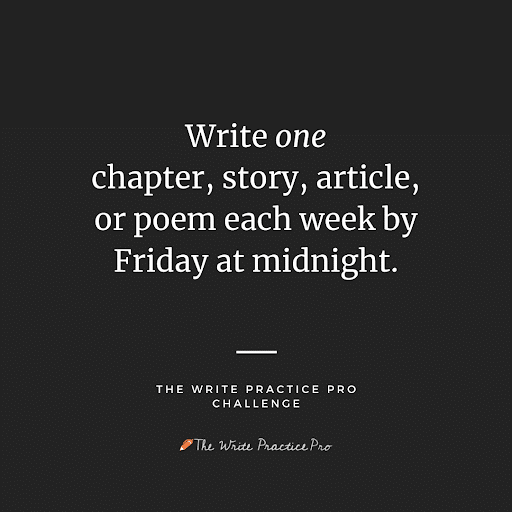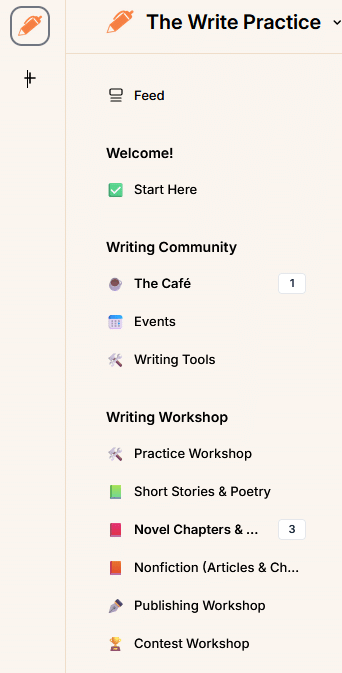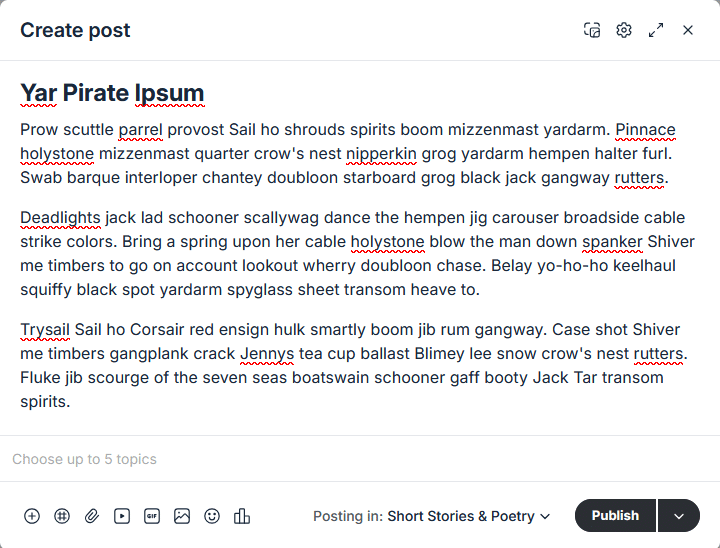How do you write beautiful, award-winning novels, memoirs, and short stories? One tried-and-true way is through a writing workshop, a program with other writers who can give encouragement, feedback, and support as you write, edit, and publish your writing.

But maybe you don't know how to join a writing workshop, can't afford the steep admission fee a masters-level creative writing program costs, or you don't live near one.
That's where an online writing workshop like The Write Practice Pro can help in.
In this post, I’m going to share what a creative writing workshop is and how you can use it to improve your writing habits, get feedback on your creative writing, and go on to publish award-winning writing. Then we’ll talk about how to find a writing workshop, whether online or locally, and how to get the most out of it.
What Is a Creative Writing Workshop?
A writing workshop guides people through the creative writing process with a focus on publishing and/or sharing their writing.
The Six Elements of a Writing Workshop
There are six parts to writing workshops:
- Lessons on the creative writing process
- Structured time to plan your writing piece and brainstorm story ideas
- Structured writing time
- Getting feedback from editors/teachers and other students/writers
- Revision time based on content/grammar/flow
- Publishing or sharing
The Limitations of Most Creative Writing Workshops
In the past, creative writing workshops haven’t been accessible to everyone. Here’s why:
1. Location Dependent
Generally creative writing workshops are done in school settings, from a Masters in Fine Arts (MFA) creative writing program to a middle school creative writing unit.
For example, one of the most famous workshops is the Iowa Writers’ Workshop, which is in Iowa City, Iowa. Hundreds of award-winning novelists and memoirists have either graduated from or taught at this program, including Pulitzer Prize winners Marilyn Robinson, Michael Cunningham, John Cheever, and more.
The problem is, if you’re going to participate, you need to be in a specific location, namely Iowa.
Iowa isn’t the only excellent creative writing program (Poets and Writers has a full list of MFA programs), and there are low-residency programs, where you can go in-person for just a few weeks per semester. But all creative writing programs require you to be in a specific location for at least several weeks and often several years.
If you can’t move your life to Iowa or some other city with a program, that rules out the possibility of improving your writing through this method.
2. High Cost
The average cost for a single class at an MFA creative writing workshop is over $3,300. The total cost can range from $27,000 up to $108,000. That’s a lot!
If you don’t have an extra $50k lying around (and if you do, call me!), participating in a creative writing workshop is probably not possible.
3. Lack of Focus on Publishing
Writers write for readers. One drawback of some creative writing workshops is they spend so much time focusing on writing for other writers, professors, and a handful of university-funded literary magazines that they forget who their real audience is.
Without a strong focus on publishing, a creative writing workshop can get lost in the weeds of writing craft that sounds good in theory but doesn’t serve readers.
Can Regular People Participate in Creative Writing Workshops? Yes, in 3 Ways
There is huge value to the creative writing workshop process for all writers and aspiring writers, regardless of whether they’re in a formal school setting or not.
The great news is that now anyone can participate in this process and use it to improve their writing and get published.
There are three main ways that people can get involved with creative writing workshops, apart from local school settings:
- Local writing critique groups
- Online writing classes
- Online writing critique groups
Let’s look at two of those, local writing groups and online writing groups.
Pros and Cons of Local Writing Groups and How to Find Them
Local writing groups are groups of people interested in writing who meet regularly (often weekly) to critique each other’s chapters and short stories and talk about the writing process.
Sometimes these groups are filled with amateur writers working on their first books and pieces, but established writers often belong to writers’ groups too.
Famous examples of local writers’ groups include the Inklings, J.R.R Tolkien and C.S. Lewis’s writing group in Oxford; the Bloomsbury Group, Virginia Woolf and T.S. Eliot’s group in London; and the more informal Lost Generation, Ernest Hemingway and F. Scott Fitzgerald’s group in Paris.
The benefit of local writers’ groups is that they give you a great chance to build relationships with other writers, and these writing friends can help you with more than just improving your chapters. They can also help you learn how to get published and how to market your writing.
Here are some ways you can find a local writers’ groups:
- Meetup.com
- Google for local writing groups in your area
- Ask other writers you know locally if they are part of a group or know of groups
- Create your own
The drawback of local writers’ groups is that these groups only provide one aspect of the creative writing workshop experience: feedback.
Getting good feedback might be a valuable part of becoming a published writer, but it’s certainly not the only part. Structured brainstorming, structured writing time (like deadlines), focusing on revision, publishing opportunities, and even lessons on creative writing are also important parts of growing as a writer.
On top of that, you might not connect with your local group (I never have!). You might not be a good fit in terms of career level, with people either far ahead of you or behind you.
Even worse, what if you don’t live in an area with a local writers’ group at all?
If a local writers’ group isn’t a good solution for you, how can you get the full creative writing workshop experience?
That’s where online creative writing workshops like The Write Practice Pro can help.
How an Online Writing Workshop Like The Write Practice Pro Works
There are several online writing workshops that overcome the hurdles we talked about above. One of the best groups is The Write Practice Pro.
The Write Practice Pro is an online creative writing workshop dedicated to helping you become a better writer, write award-winning books and short stories, and ultimately become a bestselling author.
Here’s how it can help you get the full creative writing workshop experience:
1. Lessons on the creative writing process
At The Write Practice, we believe everyone can become a great writer through deliberate practice, and one of the most important aspects of deliberate practice is solid lessons.
Through The Write Practice Pro, you can get daily writing lessons, writing prompts, and exercises to help you become a better writer. For example, click here for the top 100 creative writing lessons.
We also host regular writing courses, like 100 Day Book, where you can connect with a mentor who will walk you through the process of writing a first draft (or second draft) of a novel, memoir, or non-fiction book.
2. Planning your writing and brainstorming ideas
It can take hundreds of hours to write a book, sometimes even thousands. If you’re going to invest that time into the writing process, you want to make sure that you’re working on the right idea.
That’s why getting feedback on your idea, not just your actual writing, is so important.
In The Write Practice Pro, you can go to the workshops, such as the Novel Chapters & Memoir group, share your idea and get feedback from other writers on whether or not the idea works.
3. Structured writing time
As someone who struggles with structure, one thing I’ve learned is that if I don’t have structured writing time, I will never finish my writing! I’ve written over ten books, but I wouldn’t have finished any of them if I hadn’t leaned into structure.
The best way I know to build structure for writing is to create deadlines that I can actually keep, and in The Write Practice Pro, we have a sacred deadline that the whole community lives by. We call in The Write Practice Pro challenge:

Write one chapter, story, article, or poem per week by Friday at midnight.
If you’re in one of our writing classes, like 100 Day Book or Write to Publish, you follow this deadline. And if you’re in The Write Practice Pro, you follow it too.
Why? Because as writers, we need deadlines. Even more importantly, we need a community that will encourage us to hit the deadline even if we don’t want to.
4. Getting feedback, from editors and other writers
At The Write Practice, we believe everyone can become a great writer through deliberate practice, and one of the most important aspects of deliberate practice is feedback.
To grow as a writer you need feedback both from your peers (other writers) and from experts (an editor or teacher).
Why does feedback work? Because good writing is rewriting. But studies have shown that when you rewrite without feedback, you generally focus on surface-level edits like fixing grammatical errors and typos. However, if you get feedback, you’ll focus on content-level edits, like rewriting a section to make it more readable or restructuring the piece entirely.
The amazing thing that these studies have shown is that peer feedback is almost as effective as professional feedback. So as important as it is to get professional feedback, even feedback from writers at your same level will help you become a better writer.
Below I’ll share how to get peer feedback on your writing on The Write Practice Pro.
How to Get Feedback on The Write Practice Pro
1. Start by going to The Write Practice Pro groups menu on the left side of the screen. The Write Practice Pro is organized into several different workshop groups for critiques, including a group for short stories and a group for novels.

2. Click to your group, then “Start a post” at the top of the page. You can then copy and paste your piece into the editor. When you're done, click “Publish.”
I’m writing a Pirate Story and so I’m going to be sharing in the Short Stories workshop.
I copied and pasted my Pirate Story (from Pirate Ipsum) into the Short Story Workshop below.

3. Complete your critiquing. For each piece you publish, we ask that you critique 3 posts by other writers. This is a great way to get to know the work of other writers and make new writer friends.
You can choose which piece you'd like to critique, but it's always a good idea to look for posts that are new or haven't been critiqued as much (or even at all!) to make sure everyone in the community is receiving feedback for their work. That way everyone gets the feedback they need to improve their writing!
To give feedback, click on the title of the story you'd like to critique, then at the bottom, either click the speech bubble icon or type straight in the box where it says “What are your thoughts?”

You can then give your feedback, using our critiquing guidelines and using the Oreo Method.

5. Revisions Based on Content, Grammar, and Readability
After you get feedback, you need to edit your writing and revise it based on content, grammar, and readability.
Often this is the hardest part of the writing process, and I usually have my biggest struggles and moments of self-doubt during the revision process.
However, that’s why it’s so great to have an encouraging community of other writers. When you feel stuck, share your struggles with the community in The Write Practice Pro’s Café group. This is a great way to get tips and encouragement from the community.
6. Publishing or sharing
This is the end goal. As writers, we don’t just write. We share our writing with the world.
The Write Practice Pro makes it easy to publish. Through their partnership with Short Fiction Break literary magazine, you can publish your writing instantly on the website, sharing your writing with the world.
Here’s how it works:
How to Publish Your Writing on Short Fiction Break Literary Magazine
Note: publishing is currently only available for pieces posted in the Short Stories Workshop.
1. After your piece has been thoroughly edited, navigate to the menu bar at the top of the Short Stories Workshop.

2. Click on the link to “Submit to Short Fiction Break.” This will send you to a form that you can fill out and paste your story into.
The Short Fiction Break team will email you once your story has been accepted and published online. Congratulations!
Will the Writing Workshop Process Help You Become a Better Creative Writer?
So what’s the verdict? Will participating in the Writing Workshop process help your writing?
Yes! Even if you only participate in a local writers’ group and just get feedback, that feedback will help you strengthen your writing skills and become a better writer.
Even better, if you enroll in an MFA program or join an online writing workshop like The Write Practice Pro and go through all six steps of the workshopping process, you will become a better writer even faster.
One thing to remember, though: these workshops do not make the writing process easier. In fact, in some ways it will be harder, because you are growing in each step in the writing process.
After all, growth never comes without discomfort.
But if you follow the process and press in to that discomfort, you will become a better writer.
Ready to start the writing workshop process? Join The Write Practice Pro and get started now. Click to join The Write Practice Pro.
What is your favorite part of the writing workshop process? How has being part of a workshop helped you? Let me know in the comments.
PRACTICE
Ready to practice the writing workshop process? Here’s a writing prompt to help:
Write about a writing critique group gone wrong. Maybe two of the members are dating and get into a massive fight. Maybe one member can’t take feedback and erupts in anger. Maybe the teacher is secretly gaslighting everyone.
Whatever your writing group gone wrong looks like, write about it for fifteen minutes. When your time is up, share your piece in the Pro Practice Workshop. If you post, please remember to comment on a few other writers' goals! Not a member of our writing community yet? Join us here!
Happy writing!
Joe Bunting is an author and the leader of The Write Practice community. He is also the author of the new book Crowdsourcing Paris, a real life adventure story set in France. It was a #1 New Release on Amazon. Follow him on Instagram (@jhbunting).
Want best-seller coaching? Book Joe here.
0 Comments